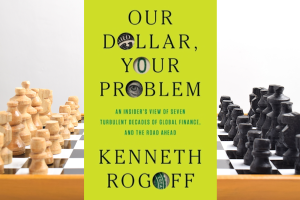. The scientist in me thrills at this opportunity to gather new data from unexplored territory; the citizen in me quails at the brinksmanship, what Martin Wolf has called “just in time, just enough”.
The global markets don’t much like European sovereign debt— even German debt!—and they don’t much like banks that hold a lot of European sovereign debt. Forget solvency, liquidity will kill you first, solvency or no. That is why the world is cutting its exposure to Europe, big time, and who can blame them.
It is true, as many commentators have pointed out, that Europe is in rough trade balance with the rest of the world; it has no deficit that requires funding. Small comfort. The current problem is all about gross flows, not net flows. In short, the world cannot cut its exposure to Europe unless Europe increases its own exposure to Europe.
But Europe too wants to cut its exposure to Europe.
Cut off from global funding markets, European banks are selling what they can sell (non-European credits), pulling back from lending commitments outside Europe ( especially Eastern Europe), and tapping their lender of last resort, the ECB, to fill the funding hole that remains. In effect, they are retreating to the core, focusing on their current European exposure. They are in no mood to take on the exposure that the rest of the world wants to shed.
The European banking system is one big MF Global, but unlike MF Global it can replace its market repo with central bank repo, and it is well on the way to doing so.
The ECB can hardly refuse, if only because it is the banker for the individual national central banks, and because these individual national central banks can hardly refuse to accept the debt of their own sovereign as discount collateral. On the other side of the balance sheet, German banks and the German national central bank can refuse to lend to other European banks and even to other European central banks, but they can hardly refuse to lend to the ECB. So the ECB balance sheet is expanding, on both sides, notwithstanding the reluctance of the ECB.
In this way, Europe is retreating to the core, focusing on funding its current European exposure that the rest of the world is no longer willing to fund in global money markets.
But it is not enough, and it is not in time. Because the underlying problem is not funding liquidity but market liquidity. Not only does the rest of the world not want to fund the European banks, given their exposures, but also it doesn’t want to hold European sovereign debt. Who will take it off their hands, and at what price?
Suppose the ECB holds fast in its refusal to backstop European sovereign debt, notwithstanding the rising chorus pressuring it to do so. So far as I can see, such a road requires the European banks to embrace the MF Global model ever more firmly, taking onto their own balance sheets all the European exposure that the rest of the world is trying to shed, and funding it (in the last resort at any rate) at the ECB.
That seems to be where we are going, for better or for worse. Make no mistake, we’re talking about financial deglobalization, as Europe gives up ROW exposure to take back Euro exposure, and the ROW does the opposite. That’s where we are going. The question is, is that where we want to be going?





